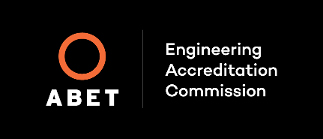Accreditation and Assessment
The Bachelor of Science degree program in mechanical
engineering at South Dakota Mines is accredited by the Engineering
Accreditation Commission of ABET, http://www.abet.org, under the commission’s General Criteria
and the Program Criteria for Mechanical and Similarly Named Engineering
Programs.

Annual enrollment and graduation data for the Bachelor of Science degree program in mechanical engineering are available on the
Student Achievement website.
OBJECTIVES
We realize that building upon traditions of excellence requires continual development of active partnerships among faculty, students, and our constituents. In keeping with these objectives, the mechanical engineering program produces graduates who are able to perform at a level that meets or exceeds industry expectations. Our students will be able to achieve the objectives listed below within a few years of graduation by attaining the outcomes below by the time of graduation.
Objective 1:
Effectively lead or manage engineering analyses
Objective 2:
Effectively lead or manage multidisciplinary engineering teams
Student Outcomes
(1) an ability to identify, formulate, and solve complex engineering problems by applying principles of engineering, science, and mathematics
(2) an ability to apply engineering design to produce solutions that meet specified needs with consideration of public health, safety, and welfare, as well as global, cultural, social, environmental, and economic factors
(3) an ability to communicate effectively with a range of audiences
(4) an ability to recognize ethical and professional responsibilities in engineering situations and make informed judgments, which must consider the impact of engineering solutions in global, economic, environmental, and societal contexts
(5) an ability to function effectively on a team whose members together provide leadership, create a collaborative and inclusive environment, establish goals, plan tasks, and meet objectives
(6) an ability to develop and conduct appropriate experimentation, analyze and interpret data, and use engineering judgment to draw conclusions
(7) an ability to acquire and apply new knowledge as needed, using appropriate learning strategies.